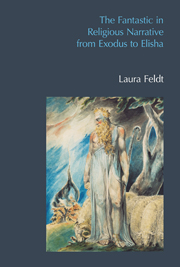Book contents
- Frontmatter
- Contents
- Acknowledgements
- Introduction: More Things—Marvels, Monsters, Miracles
- 1 Fields of Fantasy
- 2 Fantasy and Religious Narrative: Theory and Strategy
- 3 Marvels, Magic and Mystery: Reading the Fantastic in the Exodus Narrative
- 4 Between Wonder and Doubt: Fantastic Strategies, Their Effects and Status in the Exodus Narrative
- 5 Exodus as Mnemo-Fantasy: The Functions of the Fantastic in the Exodus Narrative
- 6 From Ethnogenesis to Everyday Life: Contextualizing the Fantastic in Hebrew Bible Narrative
- 7 Es spukt…—The Fantastic in Religious Narrative
- Bibliography
- Index of Biblical References
- Index of Authors
5 - Exodus as Mnemo-Fantasy: The Functions of the Fantastic in the Exodus Narrative
- Frontmatter
- Contents
- Acknowledgements
- Introduction: More Things—Marvels, Monsters, Miracles
- 1 Fields of Fantasy
- 2 Fantasy and Religious Narrative: Theory and Strategy
- 3 Marvels, Magic and Mystery: Reading the Fantastic in the Exodus Narrative
- 4 Between Wonder and Doubt: Fantastic Strategies, Their Effects and Status in the Exodus Narrative
- 5 Exodus as Mnemo-Fantasy: The Functions of the Fantastic in the Exodus Narrative
- 6 From Ethnogenesis to Everyday Life: Contextualizing the Fantastic in Hebrew Bible Narrative
- 7 Es spukt…—The Fantastic in Religious Narrative
- Bibliography
- Index of Biblical References
- Index of Authors
Summary
‘It's a poor sort of memory that only works backwards.’
(Lewis Carroll, Alice's Adventures in Wonderland, 2003: 204)Introduction
In the Exodus narrative, questions of memory, ritual, narrative and the fantastic are intricately interwoven. In this chapter I argue that an analysis of the forms of memory construction can throw light on the functions of the fantastic in Exodus.
In his seminal book on cultural memory from 1992, Das kulturelle Gedächtnis: Schrift, Erinnerung und politische Identität in frühen Hochkulturen, Egyptologist Jan Assmann speaks of different types of cultural memory. Narratives which have a founding (‘fundierende’) function he calls ‘myths’, although this is not to be understood by means of commonsensical dichotomies (fiction/myth vs. reality/history), but rather as ‘eine Geschichte, die man erzählt, um sich über sich selbst und die Welt zu orientieren’ (Assmann 1992: 75–78 [76]), that is, as stories meant to provide orientation in peoples' lives. In Assmann's view, the Exodus narrative is the founding narrative of ancient Israel in this sense Assmann 1992: 77–78). The founding function of the narrative sees the present in the light of a history which makes it appear meaningful, divinely sanctioned, necessary and unchangeable (Assmann 1992: 79). Assmann's analyses of the Exodus as an Erinnerungsfigur in both Das Kulturelle Gedächtnis (1992) and in Religion und kulturelles Gedächtnis Assmann 2000) are insightful and inspiring, as is Hendel's exegetical engagement with memory theory in a reading of the Exodus narrative Hendel 2001).
- Type
- Chapter
- Information
- The Fantastic in Religious Narrative from Exodus to Elisha , pp. 156 - 178Publisher: Acumen PublishingPrint publication year: 2012



